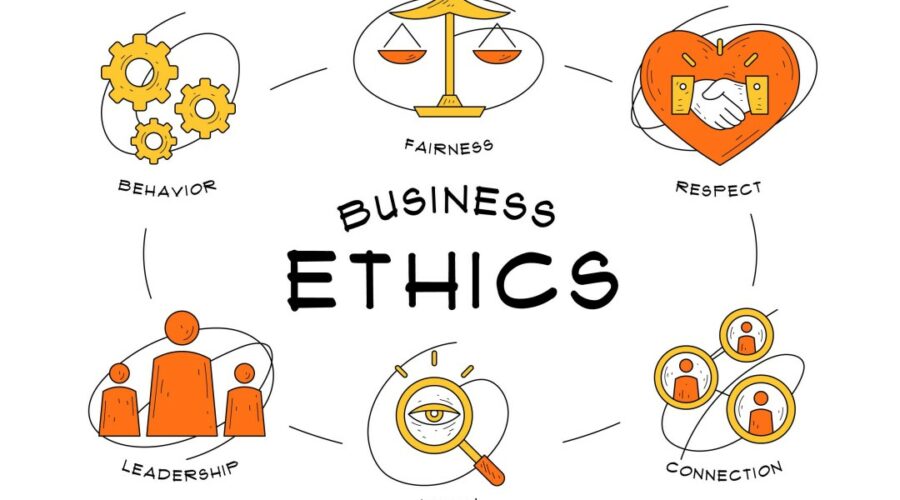Introduction
In the dynamic and ever-evolving landscape of modern business, ethics play a vital role in shaping the success and sustainability of enterprises. Business ethics encompass a set of moral principles and values that guide decision-making processes, organizational culture, and the treatment of stakeholders. As corporations face increasing scrutiny from customers, investors, and regulators, maintaining ethical practices has become crucial for building trust, reputation, and long-term viability. This article delves into the importance of business ethics, its challenges, and the benefits it offers to companies and society at large.
I. Understanding Business Ethics
Business ethics revolve around the alignment of organizational activities with moral values and societal expectations. This involves adopting ethical guidelines that go beyond mere compliance with laws and regulations. True ethical behavior requires understanding the broader impact of business activities on stakeholders, the environment, and society as a whole. Ethical decision-making involves balancing the interests of various stakeholders, including customers, employees, investors, suppliers, and the community.
II. The Importance of Business Ethics
Fostering Trust and Reputation:
Ethical conduct builds trust among stakeholders and enhances an organization’s reputation. Customers and investors are more likely to engage with companies they perceive as ethical, leading to increased loyalty and financial support.
Attracting and Retaining Talent:
Employees seek to work for organizations that align with their personal values. Ethical companies create a positive work environment and attract high-caliber talent, leading to improved productivity and retention rates.
Mitigating Legal and Reputational Risks:
Unethical practices can lead to legal consequences and reputational damage. Complying with ethical standards helps businesses avoid costly litigations and protect their brand image.
III. Ethical Challenges in Business
Conflicts of Interest:
Balancing the interests of various stakeholders can lead to conflicts, such as prioritizing short-term profits over long-term sustainability or favoring one group of stakeholders at the expense of others.
Globalization:
Operating in diverse cultural contexts can pose ethical dilemmas due to varying norms and values. Multinational corporations must adapt their ethical standards to different markets while maintaining core principles.
Supply Chain Management:
Ensuring ethical practices throughout complex supply chains can be challenging. Companies may unknowingly engage with suppliers that exploit labor or engage in environmentally harmful practices.
IV. Ethical Decision-Making Models
Utilitarianism:
This approach seeks to maximize overall happiness by choosing actions that produce the greatest good for the greatest number of people. However, it may neglect minority interests and overlook long-term consequences.
Deontology:
Deontological ethics focus on adhering to moral principles and duties regardless of the outcomes. This approach may lead to inflexibility and struggle to address complex real-world scenarios.
Virtue Ethics:
Virtue ethics emphasize the development of good character traits and promoting ethical behavior through personal growth and moral reflection.
V. Implementing Ethical Practices
Leadership Commitment:
Ethical conduct starts at the top. Leaders must demonstrate a strong commitment to ethical principles and lead by example.
Establishing Codes of Conduct:
Organizations should develop comprehensive codes of conduct that outline expected ethical behaviors and serve as a guiding framework for employees.
Ethical Training and Awareness:
Employees should receive training on ethical issues, dilemmas, and how to handle difficult situations. Raising awareness helps to create a culture of ethical decision-making.
VI. Ethical Dilemmas in Emerging Technologies
Advancements in technology, such as artificial intelligence and biotechnology, introduce new ethical challenges. Ensuring responsible use and potential consequences must be considered in the development and deployment of these technologies.
VII. The Role of Corporate Social Responsibility (CSR)
CSR initiatives allow companies to contribute positively to society, environment, and communities. Embracing CSR demonstrates a commitment to ethical values beyond profit-seeking motives.
VIII. Case Studies
This section explores real-world examples of companies that faced ethical dilemmas, the consequences of their actions, and how they addressed these challenges.
Conclusion
In conclusion, business ethics are the backbone of sustainable and responsible enterprises. Companies that embrace ethical values and practices stand to gain trust, reputation, and long-term success. Despite the challenges that businesses face in navigating ethical decision-making, the benefits it offers to society and stakeholders outweigh any short-term gains from questionable practices. By adopting robust ethical frameworks and staying committed to responsible conduct, businesses can shape a better world for the future.





